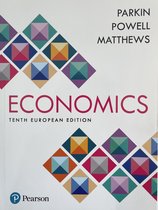Our inability to get everything we want is scarcity. What you can afford to buy is limited by your
income and by the prices you must pay, and your time is limited by a 24-hour day.
An incentive is a reward that encourages or a penalty that discourages an action.
Economics is the social science that studies the choices that individuals, businesses, governments and
entire societies make as they cope with scarcity and the incentives that influence and reconcile those
choices
- Microeconomics
The study of the choices that individuals and businesses make, the way these choices interact
in markets and the influence of governments
- Macroeconomics
The study of the performance of the national economy and the global economy.
Goods and services are the objects that people value and produce to satisfy wants. Goods and
services get produces by using productive resources that economist call factors of production
- Land – L
Land is our natural resources earns rent
- Labour – L
The work time and work effort that people devote to producing goods and services. Quality
depends on human capital: knowledge and skill people obtain earns wages, and most
income
- Capital – K
The tools, instruments, machines, buildings and other constructions that businesses use to
produce goods and services earns interest
- Entrepreneurship – A
Human recourse that organizes labour, land and capital earns profit
A choice is in your self-interest if you think that choice is the best one available for you.
An outcome is in the social interest if it leads to an outcome that is the best for society as a whole.
Recourse use is efficient (a situation that can’t be improved upon) is it is not possible to make
someone better off without making someone else worse off.
Questions about social interest:
- Globalization
This is the expansion of international trade, borrowing and lending, and investment. It is in the self-
interest of consumers because they can buy low-cost goods and services produced in other countries.
- Information revolution
The technological change of the past 40 years.
- Climate change
- Financial instability
, Market capitalism is an economic system in which individuals own land and capital are free to buy
and sell land, capital and goods and services in markets.
Centrally planned socialism is an economic system in which the government owns all the land and
capital, directs workers to jobs and decides what, how and for whom to produce.
We have an mixed economy, market capitalism with government regulation
Karl Marx and other communist and socialist thinkers wanted to replace it with socialism and central
planning. The Occupy Wall Street movement is a visible example of today’s protest.
Big corporations have too much power and influence on governments
Democratically elected government can do a better job of allocating recourses and
distributing income than uncoordinated markets
More regulation in the social interest is needed
In a market, for every winner, there is a loser
Big corporations are the winners.
Economist argue that market capitalism isn’t perfect, but the best system available. Adam Smith gave
the first account of how it works
The self-interest of big corporations is maximum profit
But an invisible hand leads decisions made in pursuit of self-interest to unintentionally
promote social interest
Politicians are ill-equipped to regulate corporations or to intervene in markets, and those
who think they can improve on the market outcome are most likely wrong
In a market, buyers get what they want for less than they would be willing to pay and sellers
earn a profit. Win-win situation
We’re going to look at six key ideas that define the economic way of thinking
- A choice is a trade-of
We must make choices. A trade-off is an exchange, giving up one thing to get something else
- Making a rational choice
A rational choice is one that compares costs and benefits and achieves the greatest benefit over cost
for the person making the choice.
- Benefit: what you gain
The benefit of something is the gain or pleasure that it brings and is determined by preferences – by
what a person likes and dislikes and the intensity of those feeling. Economist measure benefit as the
most that a person is willing to give up to get something.
- Cost: what you must give up
The opportunity cost of something is the highest valued alternative that must be given up to get it.
- How Much? Choosing at the Margin
You compare the benefit of a little bit more study time with its cost – you make your choice at the
margin. The benefit that arises from an increase in an activity is called marginal benefit. The
opportunity cost of an increase in an activity is the marginal cost.
- Choices respond to incentives
The central idea of economics is that we can predict the self-interested choices that people make by
looking at the incentives they face.



